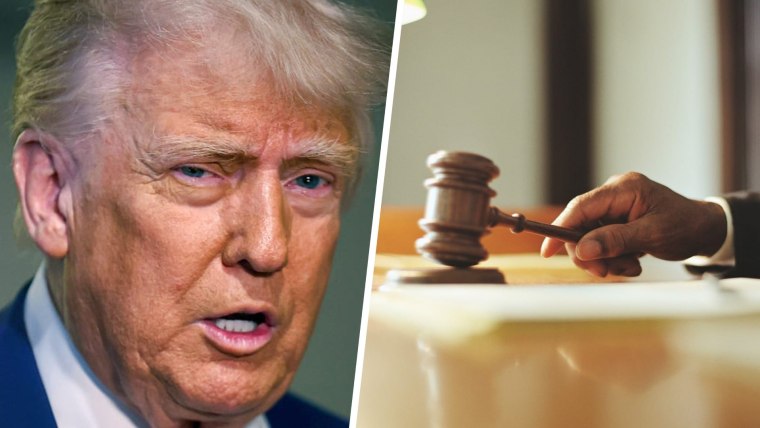Earlier this week, the Justice Department escalated its fight with the judiciary by filing an ethics complaint against Judge James Boasberg, the chief U.S. district judge in Washington, D.C. Boasberg is overseeing the case challenging the Trump administration’s deportation of alleged Venezuelan gang members to a Salvadoran prison without due process. The new complaint, signed by Attorney General Pam Bondi’s chief of staff, accuses Boasberg of making improper comments about President Donald Trump.
Only those wearing MAGA-tinted glasses could fail to see this complaint for what it is: another brazen attack on the rule of law and the constitutional separation of powers, and another crack in the foundation of American democracy.
Trump’s record of contempt for the judiciary is well established.
The controversy began March 15, when five Venezuelans sued Trump and other administration officials to block their imminent deportation under a 2025 presidential proclamation invoking the Alien Enemies Act. That 1798 law allows the removal of foreign citizens when there is a “declared war … or any invasion or predatory incursion” by a foreign nation against the United States. The plaintiffs were among hundreds being deported to a country other than their homeland. They were not given an opportunity to challenge the legality of their deportation, or even to contest the government’s allegations that they were gang members. Comparing the situation to a Kafka-esque nightmare, Boasberg ordered the administration to stop the deportations.
In April, the case went to the Supreme Court, which ruled for the administration on a legal technicality regarding the proper mechanism and jurisdiction for the suit. At the same time, the court unanimously affirmed that those facing deportation must be allowed to bring a legal challenge before removal. The case was sent back to Boasberg and remains ongoing.
Shortly after the Supreme Court’s ruling, Boasberg also found that the government had likely committed criminal contempt of court by willfully disobeying his order to stop deportations. He offered the government a chance to correct its contempt before referring the case for prosecution, but in April a three-judge panel from the D.C. appellate court paused the contempt proceedings without addressing the merits. Curiously, the pause has lasted for months, leaving the contempt action in limbo.

Then came Monday. The Justice Department formally accused Boasberg of committing misconduct during a national judicial conference held March 11 — before the deportation case began. The complaint alleges Boasberg “attempted to improperly influence Chief Justice [John] Roberts and roughly two dozen other federal judges” by expressing “his belief that the Trump Administration would ‘disregard rulings of federal courts’ and trigger ‘a constitutional crisis.’” In the AEA case, then, Boasberg “began acting on his preconceived belief that the Trump Administration would not follow court orders.” The DOJ argues that Boasberg’s “words and deeds” harmed “public confidence in the integrity and impartiality of the judiciary.”
To begin with, the DOJ’s complaint is misleading: The memo it cites, summarizing the conference, says Boasberg “raised his colleagues’ concerns,” not his own. But no matter who raised the concerns, they would be right on the mark. Trump’s record of contempt for the judiciary is well established. Throughout his first term, he repeatedly criticized judges who ruled against the administration. While out of office, Trump repeatedly leveled personal attacks against not only the judges presiding over his criminal and civil cases, but even court staff and their family members. And Trump specifically called for Boasberg’s impeachment in March after the judge ordered a temporary pause in deportations.
For this administration, legal authority depends on political loyalty rather than adherence to the rule of law.
Although Trump has publicly said that he would follow court orders, his administration’s track record on respecting judicial authority suggests otherwise. For example, in early July, the Justice Department filed an unprecedented lawsuit against the entire bench of federal judges in Maryland, challenging an administrative order issued by their chief judge regarding deportation cases. Disturbingly, there is also evidence that Emil Bove, whom the Senate confirmed Tuesday to an appellate judgeship, told DOJ prosecutors that, if necessary, they should ignore court orders that stop deportations.
Given this track record, for the Trump administration to accuse Boasberg of undermining public confidence in the judiciary is the pinnacle of hypocrisy. In truth, the complaint against Boasberg is an obvious stunt. The administration is following the old legal adage: When the facts and the law are against you, “pound the table and yell like hell.”
No matter where this complaint goes from here, it is likely to have a chilling effect on judicial independence. Judges routinely discuss their constitutional approach or emerging legal trends in public, including during Senate confirmation hearings. This complaint puts a target on the backs of judges who speak out against executive overreach or comment on other broad legal issues that could be perceived as contrary to administration policy.

It will threaten judicial independence, undermine judicial legitimacy, and ultimately show that, for this administration, legal authority depends on political loyalty rather than adherence to the rule of law.
The justices of the Supreme Court appear to at least understand this in principle. Speaking at a judicial ceremony in May, Chief Justice John Roberts emphasized judicial independence is “crucial” to “check the excesses of the Congress or the executive.” Against the backdrop of Trump’s attacks on the federal judiciary, Roberts reiterated the familiar simile that judges are like umpires, responsible for calling balls and strikes fairly and impartially.
It’s less clear whether Roberts and his colleagues are prepared to fight for that ideal. After all, when a manager’s antics — like kicking dirt at the umpire’s feet or screaming in his face — begin to undermine the integrity of the game itself, eventually even the most restrained umpire must be prepared to eject him. Without that implicit threat, the game will collapse under the bullying of any manager who is unwilling to follow the rules everyone else plays by.
No one should tolerate that: not in a sporting event and certainly not in an arena when our nation and democracy are at stake.
